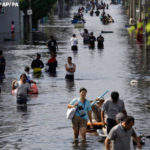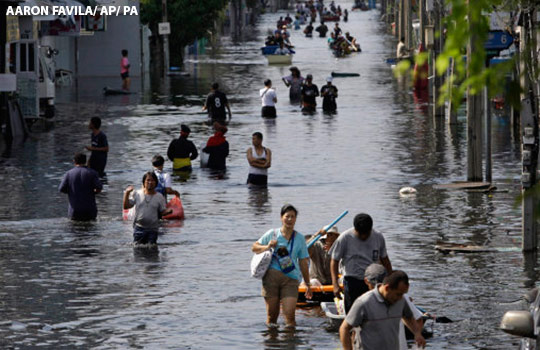 There is a looming healthcare crisis, and we are woefully short of doctors… Sound familiar? Except in this case, we are talking about the “biggest global health threat of the 21st century” (The Lancet) and one that our healthcare community is distressingly incapable of articulating the danger of.
There is a looming healthcare crisis, and we are woefully short of doctors… Sound familiar? Except in this case, we are talking about the “biggest global health threat of the 21st century” (The Lancet) and one that our healthcare community is distressingly incapable of articulating the danger of.
Catastrophic flooding in Nepal and the Indian subcontinent, multiple “1000-year” hurricanes in the Atlantic, wildfire smoke blanketing the American west: this past summer was an exacerbation of a trend that we have seen over the past several years—that climate change is driving unprecedented weather anomalies to the detriment of human health and wellbeing. Chaotic changes to our ecosystems are undermining healthy living, exacerbating illness, and stressing social determinants of health.
The list of climate-related health effects reads like a busy emergency department triage list: syncope, acute myocardial infarction (from extreme heat), dyspnea (from degraded air quality and aeroallergens), fever (from vector-borne diseases or heat stroke), vomiting and diarrhea (from diminished water quality) and trauma (from extreme weather events). All this begs the question: why hasn’t the physician community been more engaged in explaining these risks to the public?
A simple explanation is because there is not one clinical specialty that owns the topic. A nephrologist understands kidney failure from an extreme heat event; an infectious disease doctor can articulate the threats from advancing mosquito habitats; and an emergency physician appreciates the hazards of intense precipitation disasters—but few clinicians have been educated and even fewer are prepared or equipped for handling climate health threats. An example has been the recently recognized epidemics of chronic kidney disease that have led to over 40,000 deaths among manual workers living in Central America, India and Sri Lanka occurring in some of the hottest regions in the world in which recurrent heat stress and dehydration remains the dominant risk factor.
Yet as physicians, we are indeed perfectly poised to address these issues. We are natural educators, caregivers, and respected science communicators. We are society’s confidants and because of this unique role we have not only the opportunity, but also the duty to clarify the threats of climate change as well as the co-benefits from making healthier choices.
Although our niches seem disparate, we all speak the same language—medicine. It’s time for us to mobilize our incredibly rich and diverse bank of knowledge. Here’s how: We must dedicate space within our specialties to bring forth the best research on the clinical impacts of climate change. We should task our media engagement to feature healthcare providers as the “go-to” authority on coverage of climate change and its impacts. We should work with policy makers, non-profits and funders at local, regional, and national levels and offer our expert opinions in resilience and mitigation planning. We must train ourselves and each other (as we have always done)—starting with medical school and residency, and on to fellowships and continued education to become facile in understanding climate medicine; and institute cross-discipline (medicine, environmental science, public health) knowledge pollination through formalization of joint curricula, grand rounds conferences, and inter-department funding opportunities We should communicate our knowledge to our patients and transform our work in this field to the betterment of their health.
A number of physician groups have begun to move in this direction. The Royal Australasian College of Physicians has organised an International Campaign on Doctors for Climate Action. Several medical societies have begun to share educational and policy work under the auspices of the Medical Society Consortium on Climate & Health. In July 2017, a Consortium of physicians, researchers, anthropologists and climatologists at the University of Colorado launched a graduate medical education fellowship in climate and health policy. Working with partners at the Centers for Disease Control and Prevention and the National Institutes of Health, the fellowship will train young physicians to be thought leaders on this health threat, and to bring invaluable proficiencies to the forefront of policy conversations and decisions.
Yet all these actions, taken alone, will ultimately be inadequate to serve the massive and complex health challenges from climate change. A larger, more strategic approach is now in order, and one that encompasses medical intervention, education, and clinical research. As has been the case throughout human history, we have faced the maxim that “adapt or perish, now as ever, is nature’s inexorable imperative”. Let us adapt in a deliberate manner by educating a new generation of physicians, biomedical researchers and public health practitioners to track, explain, and understand changes in climate sensitive diseases, and to develop clinical interventions that make a difference.
Jay Lemery is an associate professor of Emergency Medicine at the University of Colorado School of Medicine and Associate Director of the University of Colorado Consortium on Climate Change and Health.
Cecilia Sorensen, The Living Closer Foundation Fellow in Climate and Health Science Policy.
Rosemary Rochford, Professor of Environmental & Occupational Health and Professor of Microbiology & Immunology, University of Colorado School of Medicine.
Richard Johnson, Professor of Medicine and Chief of the Division of Kidney Diseases and Hypertension, University of Colorado School of Medicine.
Competing interests: none.
This article was submitted under the auspices of the University of Colorado Consortium on Climate Change and Health.
